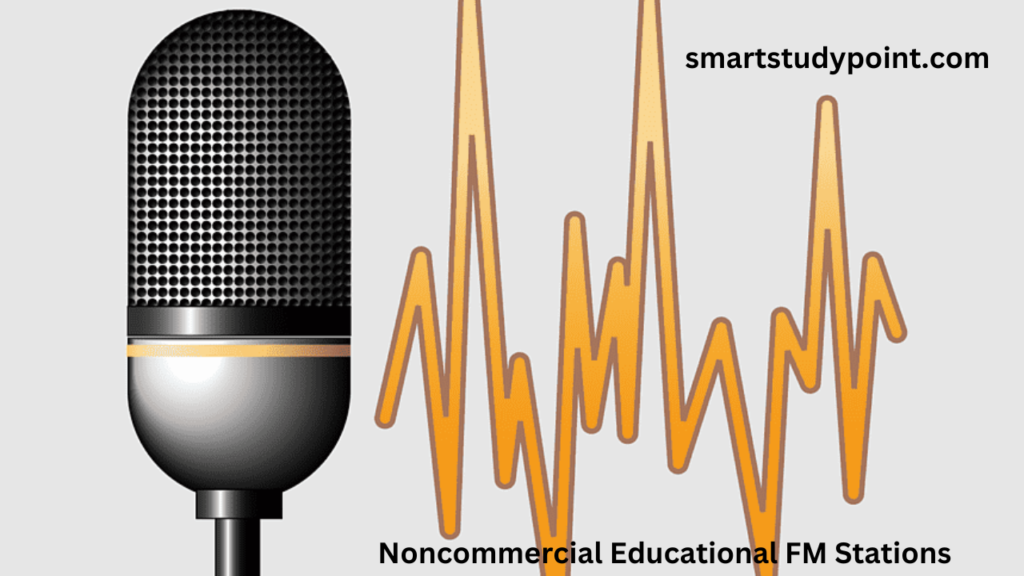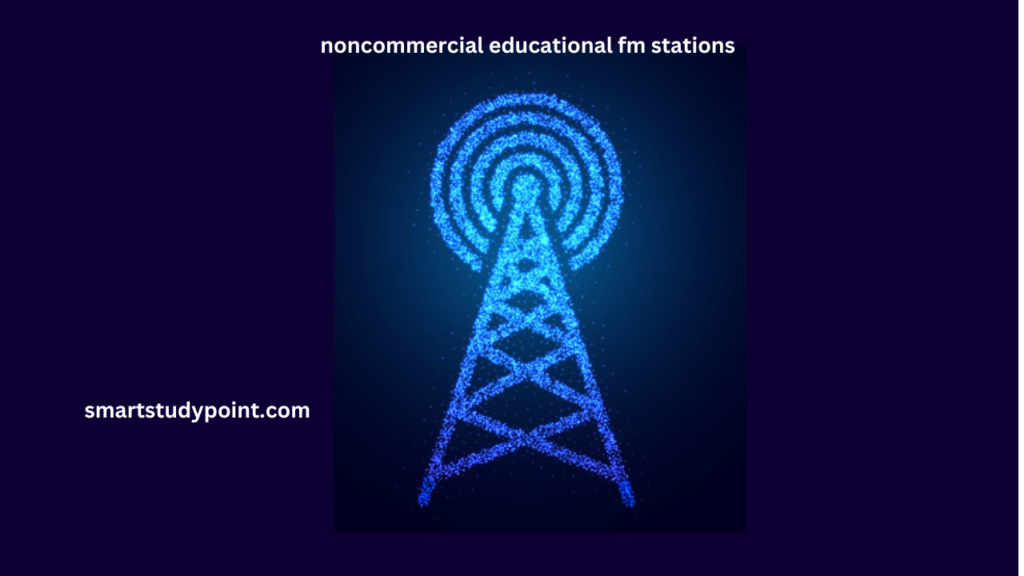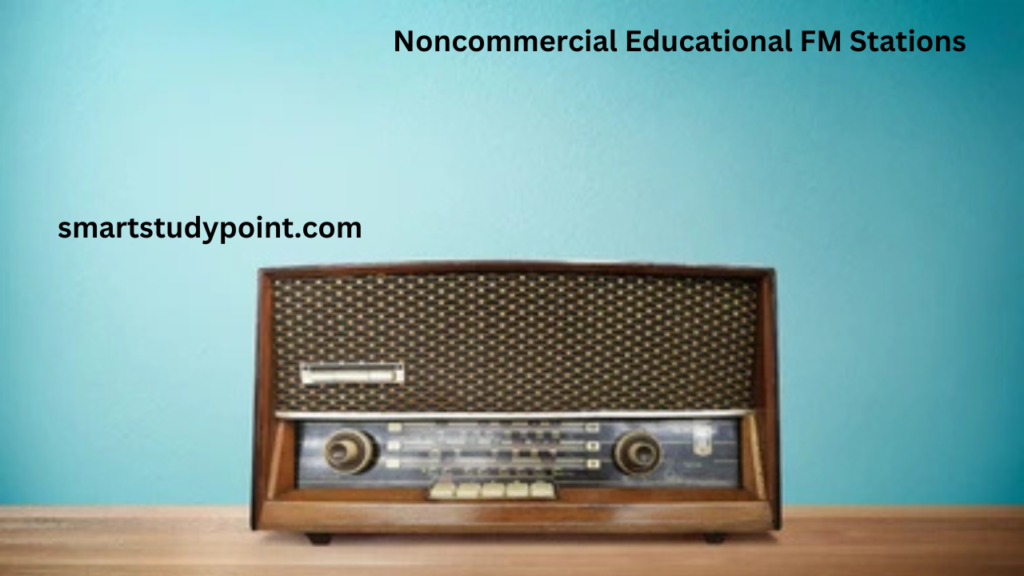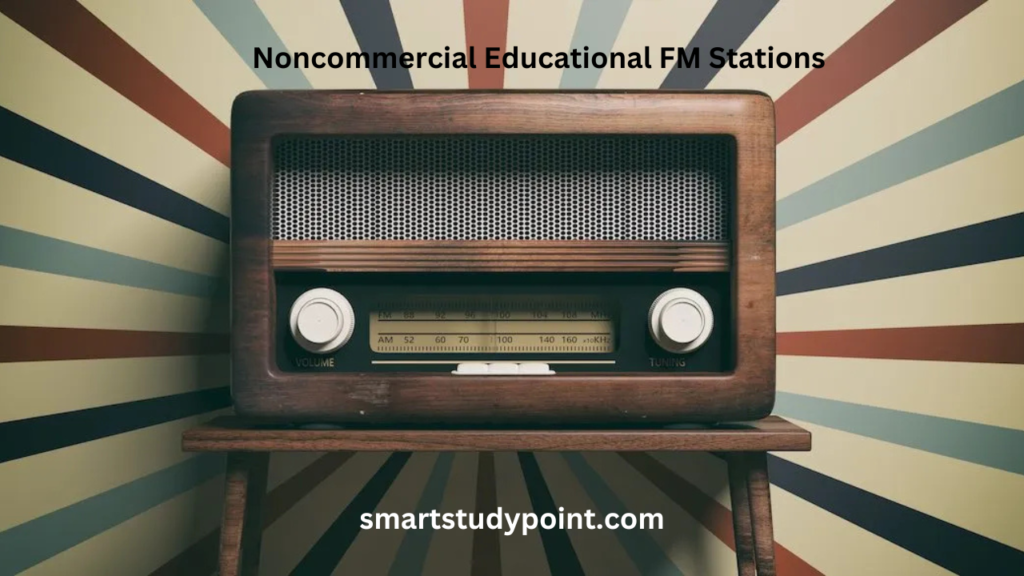Noncommercial educational (NCE) FM stations are unique in radio broadcasting because they solely transmit educational programs and public service. While other commercial stations depend mainly on ads and program sales for revenue, NCE stations are mainly supported by listener donations, grants and subsidies. A non-profit organization has the goal of creating non-profit educational and informative content for the community at large. This article analyses several factors of several noncommercial educational FM stations to show how they serve their purpose in different noncommercial stations in US effectively.This article will provide very authentic information about Noncommercial Educational FM stations.

1 NPR-Affiliated Stations:
Noncommercial educational radio can be described as a station that is non-profit venture and whose primary purpose is educational American National Public Radio NPR network can be regarded as one of the http://www. NPR was founded in 1970 and own and operate several NCE FM stations across the country offering news, cultural and educational programs.This article will provide very authentic information about Noncommercial Educational FM stations.
Some well-known NPR-affiliated stations include:
2 WAMU 88.5 FM (Washington, D.C.):
AMPR is NPR news / talk show with the connection to the American University in Washington District of Columbia. It presents all forms of programming, news, talk shows, and others; and cultural programming. Its primary show, “The Diane Rehm Show,” was on air for more than thirty years and enjoyed a national popularity due to interviews with politicians, writers, and journalists. WAMU also has some locally produced news and public affairs programs, so it is vital for people of the Washington, D.C metro area.
3 KQED 88.5 FM (San Francisco, California):
Other NPR affiliate station is the KQED which broadcasts in the San Francisco Bay Area. Among other things, KQED is famous for its award-winning news broadcasts; in its schedule, it offers shows of the NPR network, both local news broadcasts, and cultural programs. The station also airs its own programs; ‘Forum’ which is a call-in program that discusses issues of current interest in the political, scientific, health and artistic fields. The organization is coupled with KQED public education, and their programs coverage embrace important issues affecting the community.This article will provide very authentic information about Noncommercial Educational FM stations.
4 WBUR 90.9 FM (Boston, Massachusetts):
WBUR is the NPR member station with roots in Boston University. They are famous for the implementation of NPR’s programs On Point and Here & Now, which is aired across several stations all across the country. The channel also offers local news services and programs with the view of increasing the level of literacy of citizens. The station is very important in the provision of media in Boston especially in regard to investigative journalists and enlightening the public.This article will provide very authentic information about Noncommercial Educational FM stations.
5 College and University Radio Stations:
Most of the NCE FM stations are station affiliated to colleges and universities where students use it for practice and put into practice their skills in the society. This article will provide very authentic information about Noncommercial Educational FM stations. Such stations usually operate programs with information, educational programs, music and news related to the campus. This article aims at giving the reader an indication of the most famous college and university radio stations.

6 WFMU 91.1 FM (Jersey City, New Jersey):
WFMU can trace its roots back to a college radio that went astral from Upsala College and has metamorphosed into an independent non-commercial radio station.Originally known for its free-form radio format, and for not conforming to any specific format still today WFMU is a part of the culture landscape of the New York Metropolitan area.This article will provide very authentic information about Noncommercial Educational FM stations. As it was mentioned above, WFMU is not directly affiliated with a university anymore, still the station is familiar with the principles of non-commercial, avant-garde educative radio that delivers programs with the focus on subculture, experimental music and art.
7 KALX 90.7 FM (Berkeley, California):
KALX is the university station operated by the students majoring in university of California Berkeley. It also provides a variety of programing genres such as music programming, programming for public interest, and educational programing.This article will provide very authentic information about Noncommercial Educational FM stations. KALX is famous for its’, 1980s or pre-1980s, that is traditional alternatives to the commercial radio stations across the bay with a mix of indie music, underground music and community-based talk shows.Importantly, the station is part of the university’s academic function as a learning facility to practice radio venture of students who have such interests.
8 WRHU 88.7 FM (Hempstead, New York):
WRHU is the student-spin, at Hofstra University and it is said to be among the best college radio station in the United States.It programs a combination of music, sports comments, and talk shows, together with reporting local events.This article will provide very authentic information about Noncommercial Educational FM stations. WRHU has also earned national recognition for serving as the NHL’s New York Islanders’ broadcast partners to a wider audience. It also offers practice opportunities for people needing experience in journalism and broadcasting by students while also learning dissemination of relevant information to the public.

9 Community-Focused Educational Stations:
Other NCE FM stations have their roots in college stations and NPR affiliates. Many NCE FM stations are community-based and have a deep cultural and educational heritage. And acts as a public service station. This article will provide very authentic information about Noncommercial Educational FM stations. These are neighborhood-based stations, and a large number of them may provide locally generated content and address the needs of specific communities.
10 WORT 89.9 FM (Madison, Wisconsin):
WORT is an FM; licensed and non- commercial radio station televised in Madison Wisconsin and is funded by its members. It has been famous for its social justice agenda and liberal schedule of events. In its programme breakdown, WORT offers musical programs, everyday news, and the talk shows, where both local and international topics such as the environment, worker rights, and social justice are discussed. This article will provide very authentic information about Noncommercial Educational FM stations. The station is very active in issues affecting the community and offers the voice of the people in the current media system.
11 KEXP 90.3 FM (Seattle, Washington):
In its current form, KEXP is a non-commercial radio station for education that works on the basis of Seattle and is mainly focused on music programs, claiming to specialize in indie rock, post-punk, low-fi bands, mixed with afterpunk, indie soul or experimental. This article will provide very authentic information about Noncommercial Educational FM stations. But still, KEXP broadcasts educational programs and PSAs on music as well as social and cultural concerns. It also holds live in-studio performances and has recently grown as a key figure in the indie circuit of both local and national recognition.
12 KBOO 90.7 FM (Portland, Oregon):
KBOO is a Portland based community radio station, which is broadcasting news, music and educational programs.This article will provide very authentic information about Noncommercial Educational FM stations. In this regard, KBOO has the vision of empowering groups which are usually excluded from popular media institutions in the United States such as people of color; gay, bisexual and other non-cisgender people, and people who struggle for justice. From the selection of the programs, the radio station pays tribute to the cultural diversity of Portland and airs programs in various languages, environment and health, and art.

13 Religious Educational FM Stations:
A review of literature indicates that religious organizations have employed noncommercial FM radio as an educational and mobilization agent. This article will provide very authentic information about Noncommercial Educational FM stations. Several NCE stations are stations related to religious organizations, and the programs aired include; religious services, sermon, religious educative programs among others based on religious beliefs.
14 K-LOVE (Multiple Stations Nationwide):
K-LOVE is a group of a network FM noncommercial educational stations that airs contemporary, Christian music and religious content It is a large network having stations in almost every state in the United States of America. The mission of K-LOVE is to bring Positive and Encouraging Inspirational message and music programs that will keep the listeners encouraged. Among the topics covered within the network’s format there are bible studies, interviews with the representatives of the Christian community, anti-suicide, anti-drug messages, promotion of the healthy family and community services, and others.
15 Family Radio (Multiple Stations Nationwide):
Family Radio refers to a system of religious radio stations through which teachings from the Bible, religious music and education are aired. Family Radio is an American based Christian emphatic broadcasting network started in 1959 but it is a noncommercial station and mostly depends on program donations from its listeners. This article will provide very authentic information about Noncommercial Educational FM stations. It has a collection of in-depth Bible teaching, preaching sermons, and topical discourses as well that covers ethic, theology, and family. Education is insisted in Family Radio, as the station aims to prepare listeners to use their knowledge to advance their spirituality.
16 Classical Music and Cultural Educational Stations:
The NCE FM stations also have big responsibilities in the preservation and popularization of the classical music, arts, and cultural, and educative programs. This article will provide very authentic information about Noncommercial Educational FM stations. They usually feature Program that lets the listeners hear creations of artists or artists themselves, program about arts and anything related to it.
17 WQXR 105.9 FM (New York, New York):
QXR is New York Metropolitan area’s non-commercial, non-NPR member supported, classical music radio station. Located in New York Public Broadcast, WQXR is owned and has programmed a detailed out-of-door schedule of symphonies, operas, chamber and solo compositions for fans.This article will provide very authentic information about Noncommercial Educational FM stations. It also provides informative programs with the composer, musicians, and conductors as well as the analysis of the historical and cultural values of the musical compositions. Appearing in WQXR’s lineup of broader cultural and public affairs programming along with music and opera.
18 KUSC 91.5 FM (Los Angeles, California):
KUSC is a radio station broadcasting classical music format for University of Southern California. This is one of the nation’s leading classical music stations, which enthralls its audience with live concerts, recorded musicals, and informative airtime.This article will provide very authentic information about Noncommercial Educational FM stations. The purpose of KUSC is to enhance people’s understanding of classical music and it often works with other art institutions to relay the performances and conversations with performers. Of course, in parallel with music, KUSC offers programming that is informative in the best sense of the word: it uses the lessons of music, history and culture.
FAQS
What is meant by a non-commercial educational station?
The FCC defines NCE station as a television or radio broadcasting station that is not allowed to broadcast a TV or radio ads and was intended to deliver education programs in part or in full.This article will provide very authentic information about Noncommercial Educational FM stations.
By what means are the non-commercial radio stations funded?
Among the non- commercial radio stations, almost all are financed by listener’s contribution, grants and endowments. An example of this organization is the Corporation for Public Broadcasting (CPB), a governmental organization that distributes the funds provided by Congress to support public radio.
What source of income do non-commercial stations depend on?
The overwhelming majority of non-commercial radio stations are funded from listener contributions, grants and endowments. An instance of such an entity is the Corporation for Public Broadcasting (CPB), a federal entity that distributes monies appropriated by the Congress for public radio.
FM applications with low power are accepted by the FCC when?
Applications for low power FM radio in American Samoa, Colorado, Delaware, Hawaii Idaho, Missouri, New York, Ohio, South Carolina, South Dakota, and Wisconsin will be accepted by the FCC from January 16 to January 22, 2001 (Public Notice, DA 00-2831 issued on December 15, 200). This article will provide very authentic information about Noncommercial Educational FM stations.
What is NPRM FCC 1243?
NPRM FCC 12-43 is the document that is named Noncommercial Educational Station Fundraising for Third-Party Non-Profit Organizations which followed the date of April, 26th, 2012.This article will provide very authentic information about Noncommercial Educational FM stations.
Conclusion:
From this work, it can be concluded that noncommercial educational FM stations occupy a unique niche in the American media mix based on the fact that they air educational, cultural, and public service programming that may not be a priority interest of commercial stations. Many NCE stations are NPR affiliates, many are college radio stations, there are many community broadcasters, religious networks, classical music stations as well as indie music pioneers all the while serving a wide variety of audience but remaining committed to the educational and public service mission of Laurine’s media. Because of their determination to educate the public through news, articles and programs, virtually every society benefits from these useful people.